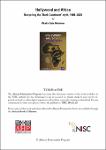Hollywood and Africa Recycling the ‘Dark Continent’ myth, 1908–2020
Abstract
Negative imaging of Africa through the Dark Continent trope continues unabated
in Western cultural productions. While colonial historiography has been successfully
challenged by various professional historians on the continent, like Ade Ajayi,
Ali Mazrui, Adu Boahen, Grace Ogot and J. Kizerbo, among others, and most
contemporary historical literature no longer entertains such biases, the same cannot
be said of cultural productions on Africa emanating from the West. The negative
representation of Africa has persisted in Western literature and more especially in
Western film through to the postcolonial era via instruments of Euro-American
cultural imperialism, with Hollywood as the biggest avenue for this warped image
production, dissemination and consolidation. There is, therefore, a need to enlighten
Hollywood’s viewership, literary adaptation scholars and policymakers on the
systematic racism in the fantastical construction of Africa in Hollywood-Africa films
and to challenge this derogatory framing of Africa as the Dark Continent with its
negative impact on Africans This book is a study of stereotypical Hollywood film productions about Africa
over a 112-year span. It traces the origins of the Dark Continent myth about
Africa from the 19th century in order to situate this mode of image production
in the context of British colonialism, racism and the ideology of empire, and to
show how the tropes of this mode of seeing Africa are incarnated across time and
space. I argue that the myth of the Dark Continent has influenced Western cultural
productions about Africa for centuries as a cognitive-based system of knowledge,
especially in history, literature, film and Western media at large, with a debilitating
chain of negative consequences for Africa. Dark Continent tropes this book tackles
include the first contact encounter between civilisation and savagery; Africa as
the unpolished, Edenic romantic utopia; Africa as the dangerous alluring; default
violence as a way of life in Africa; cannibalism as the primary marker of African
savagery; the trope of virology, where Africa is seen as the source of all killer viruses;
Africa as a cultural and intellectual tabula rasa needing to be filled with civilisation;
Africa as mere background canvas for Western action flicks; and the helplessness of
Africans and their need for Western saviours in line with Rudyard Kipling’s “The
White Man’s Burden.” Other recurring colonial modes of representing African
reality are selection/omission and contextualisation through which specific facts are
projected without historical context; and the trope of ‘synecdoche’ where a particular
crisis in an Africa country, or even in a part of a country, is used to characterise the entire continent of Africa

